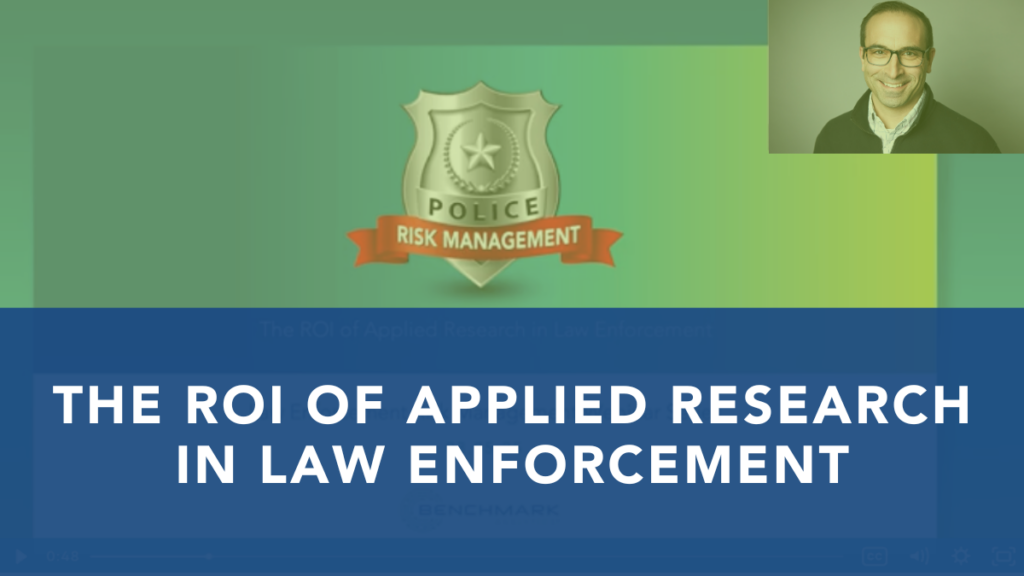Leading the Charge: Why Public Agencies Must Pioneer Technology Adoption
Posted
July 11, 2024
Share:
Recently, Benchmark Analytics attended the AWS Summit in Washington, DC, where it was emphasized that government agencies, especially those in public safety, should lead in adopting technology. Recognizing and implementing technology-first strategies is crucial for agencies to maintain relevance, efficiency, and effectiveness in their operations. Here are several compelling reasons why prioritizing and being at the forefront of technology adoption is paramount:
- Security and Compliance
As cyber threats become more sophisticated and prevalent, it is crucial for government agencies to adopt advanced security technologies to protect sensitive data and ensure the integrity of their operations. This includes:
- Implementing Modern Technologies: Modern security technologies, such as artificial intelligence and machine learning, can significantly enhance threat detection and response capabilities. These technologies can analyze vast amounts of data in real-time, identify unusual patterns, and detect potential security breaches before they can cause significant damage.
- Using Automated Systems: Automated systems can then initiate immediate responses, such as isolating compromised networks or alerting security personnel, thereby reducing the window of vulnerability.
Additionally, a critical component of security and compliance is ensuring that all employees are knowledgeable about best practices and potential threats. Regular training programs can educate staff on recognizing phishing attempts, handling sensitive data securely, and following established security protocols.
- Enhanced Efficiency and Productivity
One of the most significant advantages of integrating technology into operations is the marked increase in efficiency and productivity. The adoption of digital tools and systems allows for the streamlining of processes, which reduces the reliance on manual paperwork, minimizes the time required to complete various tasks, and improves the handling and retrieval of information — making it faster and more reliable.
For example, in a law enforcement agency, this can include:
- Use of Force Reporting Tools: The process of receiving, documenting, and managing use of force reports is crucial for law enforcement agencies for several reasons, including properly documenting incidents to ensure accountability to the public and stakeholders. Analysis of use-of-force data also allows agencies to identify trends, patterns, and areas for improvement. This information informs training programs and policy development aimed at minimizing the need for force and enhancing officer safety and community relations.
- Internal Affairs Investigations: This involves the process of investigating complaints and allegations against officers. Effective handling of internal affairs (IA) investigations with IA software ensures that allegations of misconduct or wrongdoing by officers are thoroughly and impartially examined. This process upholds the agency’s commitment to integrity and accountability.
- Training and Certification: This workflow manages the training schedules, certification processes, and continuing education requirements for officers. It includes tracking attendance, test scores, and certification renewals. Managing training and certification workflows is essential for law enforcement agencies to ensure operational readiness, uphold legal standards, foster public trust, mitigate risks, and support officer development and retention.
- Data-Driven Decision Making:
By harnessing the power of data, law enforcement agencies can make more informed and evidence-based decisions. Advanced data analytics tools can process and analyze large datasets to uncover insights and patterns that would be impossible to detect manually. This approach allows law enforcement agencies to base their decisions on concrete evidence, leading to more effective and strategic operations. Examples of this include:
- Community Engagement: Data analytics can also improve community engagement and relations. By analyzing data on public concerns, complaints, and interactions with law enforcement, agencies can better understand community needs and address them effectively. This fosters trust and cooperation between the police and the community they serve.
- Early Intervention Systems: By tracking and analyzing data on officer behavior and performance, law enforcement agencies can ensure accountability.
Research-based early intervention systems (EIS) help identify officers who may be at risk of behavioral issues or misconduct before serious problems occur. This allows agencies to take proactive measures such as additional training, counseling, or support, potentially preventing future incidents. Additionally, EIS supports officer well-being by identifying officers who may be experiencing stress, burnout, or other personal challenges early on allows agencies to provide necessary support and resources. This can improve overall officer well-being and job satisfaction.
For example, Benchmark Analytics’ First Sign® Early Intervention supports data-driven decision making. Through its advanced analytics, First Sign provides predictive insights into potential future incidents or behavioral patterns. This foresight allows agencies to intervene proactively, preventing problems rather than reacting to them.
Overall, embracing technology-first strategies is essential for government organizations, like law enforcement agencies, to uphold their commitment to public service, enhance security measures, and promote a forward-thinking and sustainable future. By leveraging tools like First Sign, agencies can proactively address challenges, improve decision-making processes, and ultimately, create safer and more resilient communities. This proactive approach not only meets the demands of today’s dynamic landscape but also lays the foundation for continued innovation and excellence in public service.
Related Posts
Ready to Experience the Benchmark Difference?
Benchmark Analytics and its powerful suite of solutions can help you turn your agency’s challenges into opportunities. Get in touch with our expert team today.



